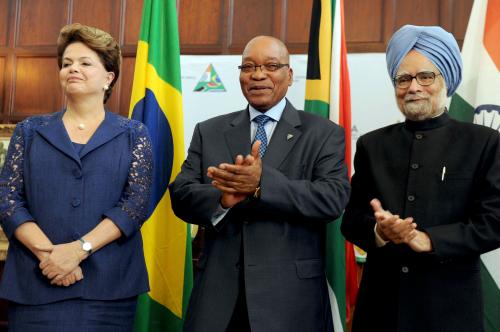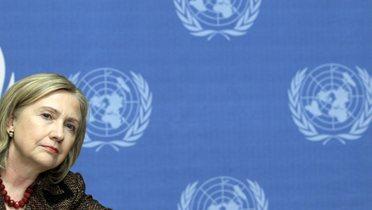With some nice words about values as an enduring guide to U.S. foreign policy, Secretary of State Rex Tillerson this week made crystal clear that when it comes to actual policies, national security and economic interests come first. Well-meaning principles like freedom and human rights sit on our shoulder like some guardian angel whispering in one ear to do the right thing…but only if it’s convenient to more important security and economic interests. He instructed his team of diplomats that
“we really have to understand, in each country or each region of the world that we’re dealing with, what are our national security interests, what are our economic prosperity interests, and then as we can advocate and advance our values, we should…”
But too often, he asserted, promoting our values is “an obstacle” to advancing our other interests, with government leaders begging Washington to back off on our unfair demands for reform. He then went on a tour d’horizon of all the compelling issues on the U.S. foreign policy agenda and did not once mention the words values, democracy, or human rights.
In one speech, Tillerson tossed out over four decades of bipartisan consensus that human rights and democracy are: 1) essential components of U.S. national security and economic prosperity, and 2) not just American values but universal values that the United States, through its long and troubled history, has adopted as the north star of national prestige and international legitimacy.
The America First posture he articulated has immediate and sweeping dire effects for U.S. standing in the world, removing any pretense that our leadership means anything more than brute military force, higher walls, and tougher trade deals. The message seems clear: The United States is, once one strips away all the high-minded rhetoric about human dignity and democracy, just like any other powerful nation intent on maximizing its own interests at the expense of others. Asking other countries to respect the international human rights obligations that they themselves have adopted apparently is just too hard to do, too inconvenient to the give and take of protecting our narrow self-interests. Putin, and his band of brothers ranging from Erdoğan of Turkey to el-Sissi of Egypt and Duterte of the Philippines, are popping the champagne as we speak.
[I]f you care about defending U.S. national security, it’s your job to support the spread of democracy.
How long will it take for this administration to climb the steep learning curve of mastering 21st century diplomacy in an era of growing global demands for more, not less, democracy and human rights? Even if one is prepared to pay a price in the loss of soft power that has long benefited U.S. leadership in the world, the Trump team will soon learn that supporting democratic institutions, rule of law, justice, accountability, and transparency are critical to protecting core U.S. national security interests. Strong democracies, after all, do not go to war with each other, do not spawn refugees, experience less civil conflict and terrorism, have more open and prosperous economies, and have a higher respect for international law and borders. In other words, if you care about defending U.S. national security, it’s your job to support the spread of democracy, particularly in countries emerging from conflict and repression where it can take years of engagement before more stable conditions emerge.
One bright spot in this otherwise dire picture is the Congress, which has long taken the lead in pushing for a greater integration of human rights and democracy in U.S. foreign policy. A bipartisan letter released by 15 Senators just this week is only the latest example of congressional demands for retaining U.S. leadership as a champion of freedom and rights. “A world that is more democratic, respects human rights, and abides by the rule of law strengthens the security, stability and prosperity of America,” they wrote. They asked this administration to “put the promotion of democracy and human rights front-and-center as a primary pillar of America’s approach abroad.” We now know this request has fallen not just on deaf ears, but with a clear no thank you. It will be up to Congress to push back harder by protecting resources for democracy and human rights programs, advocating for U.S. human rights leadership at the United Nations and other international organizations, vetting all incoming nominees for senior diplomatic positions for their commitment to human rights, and giving civil society and human rights defenders a safe home in Washington.
Yet the world does not stand still while the United States tries to get its own house in order. As Washington willfully yields ground to authoritarian states like China, Russia, Iran, and Egypt, who will step up to the plate to protect the international human rights and democracy order so painstakingly constructed from the ashes of World War II? Swing state democracies like India, Indonesia, South Africa, and Brazil to date have preferred to keep a low profile and, with no U.S. pressure to engage, are likely to continue to go their own way. That leaves the traditional Western democracies of Europe, Canada, Australia, and Japan as the bulwark against a collapse of the international system as we know it. Yes, democracies do have the equipment to self-correct, so perhaps, with public and congressional pressure, systemic failure can be avoided. But how much damage will be done in the meantime, not only to our own values, but to the fundamental values of a civilized world?







Commentary
Tillerson says goodbye to human rights diplomacy
May 5, 2017